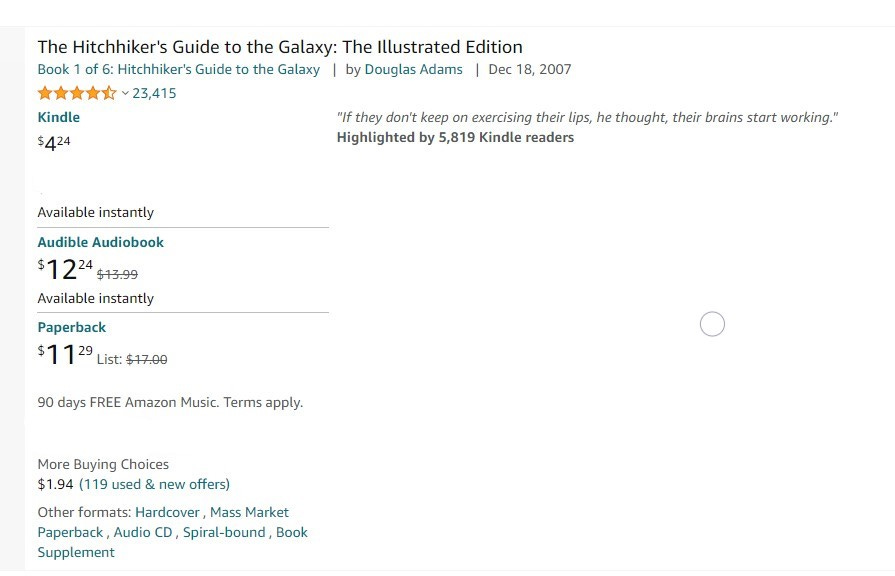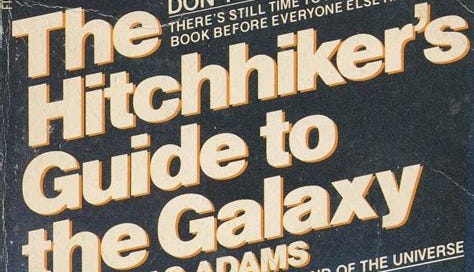Douglas Adams, Depression, Reality
Douglas Adams, the author of the Hitchhiker’s Guide to the Galaxy comedy/science fiction series (and other wonderful, hilarious works), was intimately familiar with depression. Depression runs like a vein through the first three Hitchhiker’s Guide books.
Take Marvin, the terminally depressed robot, one of the central characters. Marvin is not just any character: he’s depicted as, by far, the most intelligent character in the series, if not the universe. He has, in his own words, “a brain the size of a planet” (though how this works is never spelled out). What his brain tells him is that the universe is meaningless, life is pointless, and there is nothing to do but be depressed. At one point, Marvin explains his philosophy of life to a computer that operates a spaceship, and that spaceship commits suicide.
Or Zaphod Beeblebrox, the man who has everything that one could possibly want. He’s president of the Universe, with power and wealth beyond what he could ever need or use. He has a spaceship that can go to any place and to any time. He lives with the girl of his dreams. But all he can think to do with himself is drink himself into oblivion and get depressed. He ultimately chases away everyone who ever cared about him (including the girl).
Wowbagger the Infinitely Prolonged. Granted immortality, he becomes bitter and depressed, and the only thing he can find to do with his infinite life is spend it insulting everyone in the universe.
Then there’s the Total Perspective Vortex. This is a device that shows you how tiny you are relative to the universe: something that really, truly lets you see the size of the universe and how unimaginably tiny (and unimportant) you are. Everyone who has this experience … dies instantly.
The Planet of Krikkit, which the entire plot of one of the books revolves around, is a happy and peaceful place because none of its inhabitants know how big the universe is. (Their night sky is dark due to the presence of interstellar clouds or some such, and they think that their little planet is the only place in the universe.) Once they find out how big the universe truly is, they decide to destroy everything in it that is not Krikkit. The universe beyond their home planet is just too big. It has to go.
At one point, elevators are programmed with sentience and the ability to see a small distance into the future. They also become chronically depressed and unable to function.
Starting to see a theme here?
Through all of these characters and ideas, over and over, Douglas Adams returns to the same basic idea: the fundamental nature of the universe is hostile to happiness. If you are rational and intelligent, and understand a few very basic things about the nature of existence and the universe, depression naturally results. (And if you gain deep enough understanding, via the Total Perspective Vortex, the awfulness of your situation causes instant death!)
We are insignificant beings. Space is so enormous and we are so tiny that nothing we say, do, or become could ever make a difference. Everything we do — work, love, play, hobbies, sleep — we do in order to forget our own insignificance and the stupidity and pointlessless of everything. Even if we achieve everything could possibly want — love and power and sex and notoriety and wealth and fame and all of it — even then we would not achieve happiness. Quite the contrary: with nothing to aim for any longer, we would find ourselves with nothing but time on our hands. If we are honest, the only thing we’ll be able to do with that time is use it to reflect on our unending misery in a hostile, meaningless universe.
Reality, understood correctly, is inherently unhappy for humans (and all other rational creatures). To be truly aware of the nature of existence is to be depressed. To achieve is to be depressed. (To fail to achieve is no better, of course.) Depression is not merely a state of mind or a mood — it’s rationally required of all of us. If you’re not depressed, you’re not paying attention.
You will not be surprised that Douglas Adams himself suffered from depression for many years. He was in so much pain! And probably the central point of the books was to illustrate and argue for the idea that we should all be suffering, as much as he was. Somehow the resulting books were hilarious and incredibly popular.

To be clear, I love these books. I grew up on them and read them dozens of times. I remember a ton of passages word for word. But what I think that I am learning is something like the precise opposite of what Adams believed, in two respects.
(1) Mind and Body
An unstated assumption in the books, and an assumption that I think is very common throughout our culture, is that the mind is the most important aspect of who we are. Human nature is both mind and body, yes, we will agree with that in theory … but in practice we think of ourselves as essentially being minds.
My mind is who I am. My body is just along for the ride. My body is just the thing that I use to carry my mind about from place to place. The body gets sick, it gets injured, it has to be cleaned and fed and maintained. Basically, it’s a hassle.
We theorize that emotions like depression are results, not causes. Cause: mental activity. Result: emotion. The emotion is felt in the body, but it’s created in the mind.
I say no. No! All of this is backwards. The body comes first. Emotions come first.
We believe that our thoughts are true because they feel true. The “feeling true” of any thought is just that, a feeling. It’s in the body. When a thought doesn’t feel true, it crosses our minds and then disappears without a trace. When it does feel true, we notice it and pay attention to it and believe it.
Douglas Adams believed that the universe was an inherently depressing place? Why? Because it felt true. In his body. So he kept coming back to the thought, and it kept depressing him, so he kept pushing it away, so he kept hating it, so he kept feeling depressed. As always, unhappiness is a loop.
To get out of the loop, he needed to feel his feelings — or find some other way to treat his depression. No loop = no depression. After exiting the loop, he could have realized that he was wrong the whole time. There’s just nothing inherently depressing in the size of the universe. (If you think there is, well, you’re depressed too!)
(2) Happy and unhappy
For Douglas Adams, the arc of the universe bends toward unhappiness. We’ve already seen his reasons.
I’m starting to believe exactly the opposite. As I feel my feelings and learn more about myself, I’m finding it more and more difficult to be anxious or unhappy for any length of time.
Buddhism claims something very similar, of course. The aim of the spiritual journey is, ultimately, the cessation of suffering. I think the Buddhists are basically correct on this point.
I’m imagining five years ago, say, before I went through any of this, someone asking me: “So, Kent, do you think the universe is basically happy or unhappy? Is it in the nature of being human to be happy, or no?” (Apparently I’m somewhere that people talk like that. Maybe I crashed a college party.) My answer would have been (and now apparently I’m at a college party in the late 1980s): “Duuuude, that’s deep. But I think it’s a meaningless question! Happiness or unhappiness lies in the individual. If you say you’re unhappy, who am I to say otherwise?”
I don’t believe that anymore. What I’m about to say is very weird … and I want to be clear: I know it’s weird! But I honestly believe that there is a correct answer. And the correct answer is that happiness is normal. Happiness is the default state of human being. If we believe that unhappiness is a normal or default state for a human being, then something has gone wrong. We’ve been fundamentally misled — by our culture, our politics, our friends and family, our books and movies, even our own minds. We have failed to notice what and how we truly are.
“You shall see the truth, and the truth shall make you pretty darned happy?” Something like that.
Now, I know: this sounds ludicrous. It sounds like I’m making light of the struggle. I’m not, or I hope I’m not. Some days it’s completely impossible to be happy at all! Sometimes everything just hurts so fucking much. Believe me, I’ve been there. I talk like this because I’ve been there. And I still have those days sometimes.
But the path is there, and the end point is there.
Oooh, I can finish up with a tl;dr
In the Hitchhiker’s Guide books, humans are primarily minds, and it’s inherently an unhappy thing to be a mind. In my view, we are primarily bodies, and it turns out (surprisingly!) that being a body is a pretty sweet deal.



